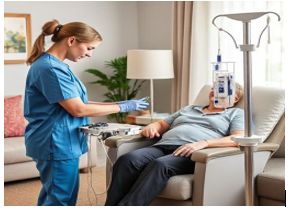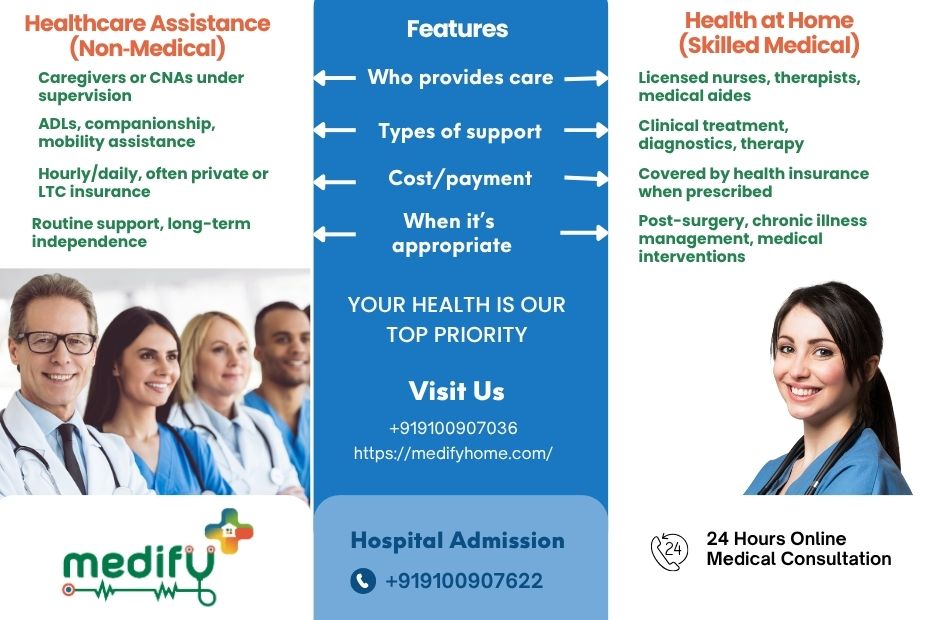Introduction: The Rise of Home-Based Healthcare
Healthcare is changing fast, and more people now want medical services that come directly to their homes. As the population grows older and life gets busier, home-based healthcare has become more common and in demand.
However, there’s often confusion between the two terms, healthcare assistance and home health care. Many people think they mean the same thing, but they refer to different kinds of home medical services.
Knowing the difference between them can help you choose the best care for yourself or your family.
In this easy-to-follow guide, we’ll explain both types of care, their benefits, and what they cost. You’ll also get help figuring out which home healthcare option is the best fit for your needs.

What is Healthcare Assistance?
Healthcare assistance means getting professional help to take care of your daily health and medical needs. It focuses on giving practical support with things like taking medications, attending doctor visits, or managing health conditions.
Key Features of Healthcare Assistance:
Personal Care Support:
- Help with medication management and reminders
- Assistance with medical appointment scheduling
- Support with medical equipment usage
- Help with health monitoring activities
Administrative Healthcare Help:
- Managing insurance paperwork
- Coordinating with healthcare providers
- Organising medical records
- Scheduling follow-up appointments
Daily Living Support:
Healthcare assistance often includes help with everyday tasks that affect your health, such as:
- Helping you move around safely and stay active
- Assisting with personal hygiene, especially if you have health issues
- Supporting you with simple exercises prescribed by a therapist or doctor
- Making sure you follow a special diet based on your medical needs
What is Health at Home Care?
Home care is a complete medical service that brings trained healthcare professionals to your house. Instead of going to a hospital or clinic, you can receive clinical care right in the comfort and safety of your own home. This makes healthcare more personal, convenient, and accessible, especially for those who find it hard to travel.
Main Features of Health at Home Care
-
Professional Medical Services
- Registered nurses visit your home to give treatments like medications or wound care
- Physical therapists help you with exercises to improve movement and strength
- Caregivers can perform IV therapy, injections, and other medical procedures as needed
-
Diagnostic Services
- Professionals can collect blood and other samples for lab tests
- They perform basic health checks like blood pressure, sugar, and oxygen levels
- Regular health evaluations help track your progress and identify any issues early
-
Specialised Care
- Support after surgery to help with healing and pain management
- Help with managing long-term health conditions like diabetes or heart disease
- Rehabilitation services to improve mobility after an injury or illness
- Palliative and hospice care for comfort and quality of life in serious illness
Who Provides This Care?
Health at home care is delivered by licensed and trained professionals, such as:
- Registered nurses (RNs)
- Physical therapists
- Occupational therapists
- Medical aides and caregivers
- Other specialised healthcare workers

Key Differences Between Healthcare Assistance and Health at Home
Understanding the differences between Healthcare Assistance and Health at Home services is important to ensure you can select the care that best fits your needs.
-
Level of Medical Care
Healthcare Assistance
- Offers help with everyday health-related tasks
- Includes reminders to take medication and basic health checks (like temperature or pulse)
- Does not include complex treatments or medical procedures
- Focuses on keeping you healthy through routine care and support
Health at Home
- Provides medical care like wound treatment, IV therapy, or injections
- Includes lab tests, health assessments, and other diagnostic services
- Offers advanced treatments and therapy for recovery or ongoing conditions
- Designed for people needing active medical treatment at home
-
Professional Qualifications
Healthcare Assistance
- Provided by trained caregivers or health aides
- May include certified nursing assistants (CNAs)
- Staff are trained to help with basic health tasks under supervision
- Care is guided by healthcare professionals but not delivered by them directly
Health at Home
- Services delivered by licensed medical professionals
- Includes registered nurses, physical/occupational therapists, and specialists
- Team members have advanced clinical training and skills
- All care is supervised by medical experts with proper credentials

-
Scope of Services
Healthcare Assistance
- Long-term support for daily health and personal needs
- Offers companionship, emotional support, and help with bathing, eating, etc.
- Helps maintain a person’s independence and comfort at home
- Suitable for people who need regular support but not medical care
Health at Home
- Usually for short to medium-term needs like recovery or rehab
- Involves specific medical treatments and therapy at home
- Best for people recovering from surgery, managing chronic illness, or needing medical procedures
- Includes regular health monitoring and clinical support
-
Cost Considerations
Healthcare Assistance
- Typically more affordable since it involves non-medical care
- Often billed by the hour or day
- Can be covered by long-term insurance care or paid out-of-pocket
- Less expensive than nursing homes or hospitals
Health at Home
- Generally, it costs more due to professional healthcare staff involvement
- May be covered by Medicare, private insurance, or employer-provided plans
- While more expensive than basic assistance, it’s still more affordable than hospital stays
- Offers good value when ongoing medical care is needed at home
Benefits of Healthcare Assistance Services
- Comfort in Familiar Surroundings: Getting care at home means you stay in a place you know and love. This helps reduce stress and brings emotional comfort. You can follow your usual routine while still getting the health support you need.
- Care That’s Just for You: Home health assistants create care plans that are specially made to your specific needs and health goals. Because the care is personalised, you’re more likely to feel better and see positive health results.
- A More Affordable Option: Compared to moving into a nursing home or assisted living facility, home healthcare is usually more budget-friendly while still offering the help you need.
- Keeping Family Involved: When care happens at home, family members can be more involved in your daily routine and healthcare decisions. This brings families closer and provides extra emotional support.
- Promotes Independence: With the right kind of help, you can continue living on your own and doing the things you enjoy. Home healthcare supports your independence while keeping you safe.
- Flexible Care Timing: Home care services are available when you need them. Whether you want help for just a few hours a day or need full-time care, scheduling is flexible to fit your lifestyle.
Benefits of Health at Home Care
- Professional Medical Support at Home: With health at home services, you get expert medical care right where you live. Licensed nurses, therapists, and trained professionals provide treatments, therapy, and even medical procedures without needing to visit a hospital.
- Fewer Hospital Visits: Regular checkups and ongoing care at home can catch health problems early. This helps prevent serious issues and reduces the need to go back to the hospital again and again.
- Quicker Healing Process: People often recover faster at home than in a hospital. Being in a comfortable and familiar place can improve mental well-being and speed up physical healing.
- Lower Infection Risk: Hospitals can expose patients to infections. Home care keeps you away from these risks, which is especially helpful for older individuals or those with weaker immune systems.
- Better Teamwork in Care: Your home healthcare team works closely with your doctors and specialists. This makes sure that everyone is on the same page and your treatment is well-coordinated.
- Smarter Healthcare with Technology: Modern home care uses tools like video calls with doctors, devices that track your health, and apps to manage your care. These tools make your treatment more effective and connected.
Who Needs Healthcare Assistance?
Healthcare assistance services are ideal for various individuals and situations:
- Seniors Ageing in Place: Older people who want to remain in their homes but need help with daily health management, medication reminders, and basic care tasks.
- Individuals with Chronic Conditions: People managing diabetes, heart disease, arthritis, or other chronic conditions who need ongoing support with health monitoring and lifestyle management.
- Post-Hospital Discharge: Patients who have been discharged from the hospital but still need non-medical support during their recovery period.
- Busy Families: Adult children who cannot provide full-time care for ageing parents but want to ensure they receive proper health support and assistance.
- People with Mobility Issues: Individuals with physical limitations who need help with daily activities, mobility assistance, and health-related tasks.
- Those Seeking Preventive Care: People who want to maintain their health proactively and prevent more health issues from developing.
Who Benefits from Health at Home Services?
- People Recovering from Surgery: Patients who have had surgery and need regular medical care at home, like checking wounds, giving medicines, and support with healing and exercises.
- Managing Long-Term Illnesses: Those with serious health problems, such as heart disease or diabetes, who need regular checkups, treatments, and changes in care based on their condition.
- Older Adults with Many Health Issues: Older adults who have more than one health problem and want to stay in their own homes while still getting full medical care and regular monitoring.
- People Who Need Skilled Nursing: Patients who require expert nursing services, such as giving IV fluids, changing dressings, or managing complex medications, can all be done safely at home.
- Recovery Through Therapy: Anyone healing from a stroke, accident, or serious illness who needs special help like physical therapy, speech therapy, or learning daily activities again.
- Comfort Care at Life’s End: People with life-limiting illnesses who prefer to receive loving, gentle care in their homes, with support for both their comfort and emotional well-being.

How to Choose the Right Option for Your Needs
Understand Your Health Needs
Pick Healthcare Assistance if:
- You need help with daily tasks like bathing, dressing, or cooking
- You want reminders to take your medicines
- You’re looking for someone to talk to and give emotional support
- You need help getting to doctor appointments or managing your health routine
- You want long-term support to live safely and independently at home
Pick Health at Home Care if:
- You need medical treatments done by trained professionals
- You require care from a nurse or need therapy services
- You’re recovering from surgery or just came home from the hospital
- You live with serious health issues that need regular medical care
- You need medical tests or health monitoring at home
Check Your Budget and Insurance
Look at your finances and insurance plans to see what kind of care you can afford. Medicare may help cover medical home care. For non-medical support, private payment may be needed.
Look at Your Family Support
Think about whether family members can help you. In many cases, combining family care with professional help is the best choice.
Plan for the Future
Think about how your health might change. You may begin with basic care and later need medical care at home as your needs grow.
Future of Home Healthcare Services
Using Technology in Care
- Tools that track your blood pressure, heart rate, and other vital signs from home
- Video calls with doctors for check-ups and advice
- Apps to remind you to take your medicine on time
- Wearable gadgets that monitor your health all day
Smarter Systems with Artificial Intelligence (AI)
- AI tools that check your health and warn of possible risks early
- Machines that give you the right medicine at the right time automatically
- Smart home devices that keep an eye out for falls or emergencies
- Data systems that help doctors prevent health problems before they start
More Services Available at Home
- Advanced treatments that used to require hospital visits
- Medical tests and screenings are now done right at home
- Better care for people with long-term illnesses
- Support for mental health, stress, and emotional wellness
Easier Access for Everyone
- More insurance plans now pay for home health services
- Lower-cost options and flexible payment plans
- Services reaching people in rural and remote areas
- Home care works closely with regular hospitals and clinics
Conclusion: Making the Right Healthcare Decision
Both healthcare assistance and home health care are great choices for people who want to stay at home and still get quality care. The key is knowing what kind of help you or your loved one needs, how much you can spend, and what your long-term health goals are.
Healthcare assistance is best if you need help with everyday activities like bathing, dressing, or remembering to take medicine. It also provides basic health support and companionship.
Home care is better for people who need professional medical care, like nursing visits, physical therapy, or help after surgery.
You don’t have to choose just one. Many people use both types of care at different times. For example, someone might start with daily help and later add medical care as their needs change.
What matters most is making sure the care fits your situation, supports your independence, and keeps you healthy and comfortable. Talk to doctors, look into care providers near you, and choose what’s best for your life.
With the right home care, you can feel safe, stay independent, and get the support you need – all without leaving your home.


